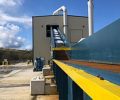Recycling is part of EPA vessel cleanup program
Recycling is part of EPA vessel cleanup program
<![CDATA[
The United States Environmental Protection Agency (EPA) says it is supporting Puerto Rico, the U.S. Virgin Islands (USVI) and the U.S. Coast Guard in marine vessel recovery work following an active hurricane season, and that it is “assisting with the recycling and disposal of recovered oil and hazardous materials from the vessels.”
“Our role is to assist both Puerto Rico and the USVI to minimize environmental damage from boats leaking gasoline, fuel or other contaminants,” says EPA Regional Administrator Pete Lopez. “We are doing this in a way that respects the vessel owner’s rights while still protecting people from spills and hazardous substances that might be onboard the vessels.”
Teams from the Coast Guard and various agencies continue to locate, assess and retrieve sunken, damaged and derelict vessels around Puerto Rico and the USVI, according to the EPA.
EPA’s support role includes recording the vessel’s location and collecting information such as the name of the vessel and identification number, condition, impact to surrounding areas or sensitive or protected habitats (such as mangroves and coral reefs) for future recovery missions and owner notifications. A higher priority is placed on vessels found to be actively leaking fuel or hazardous materials, where containment and absorbent booms are placed to decrease contamination.
Once a damaged vessel is brought to shore or is processed on a staging barge, EPA indicates it is handling various hazardous materials for recycling and disposal, including petroleum products (oil, gas or diesel fuel), batteries and electronic devices. EPA also states it will recycle or dispose of any “household hazardous wastes,” such as cleaners, paints or solvents and appliances from the vessels.
Assessment teams are tagging vessels with a sticker requesting that owners contact the U.S. Coast Guard to either report their vessel’s removal, or to request U.S. Coast Guard assistance in its removal. There is no cost, penalty or fine associated with the removal of the vessels, according to the EPA.
As of mid-November 2017, 340 vessels have been identified as being affected in Puerto Rico and 589 vessels have been identified as being affected in the U.S. Virgin Islands. Those seeking more information about the process can contact the U.S. Coast Guard through its hotline at (786) 521-3900.
]]>
Source: Recycling Today
Recycling is part of EPA vessel cleanup program
<
